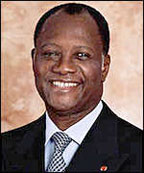PARIS/ABIDJAN, (Reuters) – The World Bank froze funding to Ivory Coast yesterday and presidential claimant Alassane Ouattara’s top aide called on world leaders to consider force to oust incumbent Laurent Gbagbo.
Gbagbo has refused to quit after a Nov. 28 vote that the electoral commission,

African countries and Western powers say he lost to Ouattara, sparking a dispute that has killed 50 people and could rekindle civil war in the West African state.
With intensifying diplomatic pressure having failed to move Gbagbo, the prime minister of Ouattara’s rival government, Guillaume Soro, said the “only solution” to the crisis was for world leaders to use force to oust him if other measures fail.
The U.S. State Department said world powers would consider bolstering the existing U.N. peacekeeping force there.
“It could be that that kind of reinforcement would be another way to send a message to President Gbagbo,” State Department spokesman P.J. Crowley said at a news briefing.
France advised its 13,000 citizens now in its former colony to leave as the risk of conflict grows.
Germany and Britain also advised against travel to the country and urged citizens to leave, a day after Nigeria evacuated diplomatic staff following an attack on its embassy.
World Bank head Robert Zoellick said funds for Ivory Coast had been cut off, a move to squeeze Gbagbo financially. According to the World Bank website, the global lender has aid commitments to Ivory Coast of $842 million as of January 2010.
“They have already been frozen,” Zoellick said in Paris.
A World Bank statement added: “The World Bank (supports) … the message to President Gbagbo that he lost the elections and he needs to step down.”
It is not clear whether any nations will heed Soro’s call for intervention, but the success of such a move would depend on the level of resistance likely to be shown by the army, which is seen as divided.
Ouattara’s camp and the European Union have sought to widen those divisions by calling on the military to back Ouattara.
In an address on state TV on Wednesday night, army spokesman Babri Gohourou sought to dispel rumours of a divided army.
“There is no doubt about the cohesion as perfect brothers in arms of the security and defence forces,” he said. “(We) also reaffirm our unfailing attachment to the president.”
The European Union and the United States have imposed sanctions on Gbagbo and key supporters to force him to go, and African countries have offered him a soft landing in exile.
But Gbagbo has shown no sign of caving in to the pressure and on Tuesday he invited an international committee to re-examine the results of the vote, a move that a Ouattara spokesman dismissed as a delaying tactic.
“For the past five years he tried manoeuvres to postpone the elections. Finally we got there, he lost, and he doesn’t want to give up power,” Patrick Achi, a spokesman for Ouattara’s rival government, told Reuters by telephone yesterday.
The turmoil in the world’s top cocoa-producing country has boosted cocoa prices to recent four-month highs, disrupting export registrations and raising the spectre that fighting could block transport and shipping.
Provisional results from the poll showing Ouattara with an 8 point victory in the election were validated by the United Nations but overturned by Ivory Coast’s top legal body, headed by a staunch Gbagbo ally, on grounds of alleged fraud.
The United Nations Security Council this week defied Gbagbo by extending the mandate of its 10,000 strong force.
Hundreds of the peacekeepers are protecting an Abidjan hotel where Ouattara set up his headquarters, and U.N. Secretary General Ban Ki-moon accused Gbagbo’s forces of blockading it.




